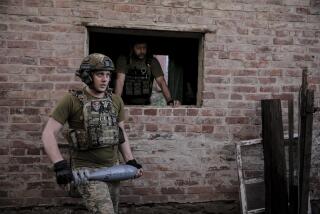New Information Flow May Aid Gorbachev in Limiting Military
- Share via
Five days before the meeting at which Mikhail S. Gorbachev dramatically strengthened his authority within the Kremlin hierarchy, the Soviet military made an interesting announcement.
A spokesman for the general staff said that, in order to promote public discussion of defense issues, a lot of hitherto secret military information would be made public.
On that same day, Gorbachev warned that perestroika, his drive for economic and social reconstruction, was in serious danger of failing--in part because angry consumers can’t see what’s in it for them.
The timing of the military announcement was presumably coincidental. But in fact there may be an important connection between Gorbachev’s alarm over the slow pace of economic reform and the prospective easing of military secrecy.
Gorbachev’s strategy for achieving perestroika has always involved a serious contradiction. In order to help overcome resistance from bureaucrats and party officials who stand to lose power and perks under the reforms, the Soviet leader has gone over their heads to the people.
Yet the reform effort, by its nature, was bound to create short-term disruptions and, therefore, even greater scarcities of consumer goods. The payoff, if it comes, will be a few years down the road.
But impatience is rising. To head off public disillusionment, which plays into the hands of his opponents, Gorbachev needs to produce results that are meaningful to the average citizen.
If additional resources are to be brought to the task, they can really come from only one place: reductions in the huge allocations of money, manpower and technology to the military.
Western experts disagree whether Soviet defense spending has already leveled off; they doubt that shifting resources away from the military can have a quick payoff.
But the alternatives--quick-fix imports of more food and consumer goods, and accelerated conversion to family farming and privatized consumer services--have practical disadvantages of their own.
A reduced priority for military spending is almost certainly part of Gorbachev’s economic game plan.
The Soviet leader has taken the all-important step of introducing a doctrinal justification for a reduced military Establishment.
He and his supporters have thrown out “class warfare” as the basis for Soviet foreign policy in the nuclear age--meaning that capitalist and communist countries don’t have to be enemies.
The “threat” from the West is being downgraded. And “reasonable sufficiency” is the new standard for defense spending.
Meanwhile, the Soviets have been pulling out of Afghanistan and seem to be playing a positive role in efforts to end the war in Angola and obtain the withdrawal of Vietnamese troops from Cambodia.
Having signed a treaty to destroy their SS-20 medium-range missiles, they profess a willingness to make lopsided cuts in non-nuclear forces in which they enjoy a numerical superiority relative to the Western alliance.
Unfortunately, we can’t afford to take all this at face value. Not yet.
The conservatives who oppose Gorbachev’s “new thinking” on international relations are down but not out.
When Soviet military men talk about asymmetrical cuts in conventional arms, they attach conditions that they must know are unacceptable. And, as Defense Secretary Frank C. Carlucci told a group of Soviet generals, it is hard to square talk of a defensive doctrine with the fact that Soviet forces are still armed, organized and trained for the offensive.
A House subcommittee, in a recent report, credited Gorbachev with a desire to restructure the military system but concluded that he had been unable to force his will on the armed forces.
Enter the question of secrecy.
In a basic sense, the Soviet military is clearly under the civilian-run Defense Council and the Politburo. However, Condoleeza Rice of Stanford, an expert on the subject, makes the point that the Soviet general staff traditionally has had a decisive voice on military strategy and tactics, and on the choice of weapons--things that impact heavily on budgets.
If Gorbachev is truly trying to force a down-sizing of the military forces, this must change. But it can’t change as long as the military keeps a near-monopoly on nuts-and-bolts defense information.
Soviet journalists and diplomats have long complained that all they know about Soviet weapons and troop strength is what they read in Western publications. Even Gorbachev’s advisers are said to have no information base comparable to that of the U.S. National Security Council.
Against this background, the general staff’s announcement that considerable information on “the combat composition, strength and technical equipment” of the armed forces will be made public is of great potential importance.
That’s good news for the West. In Soviet terms, however, the larger significance is that Gorbachev may have nailed down meaningful access to nitty-gritty military information for his own advisers even before last weekend’s Kremlin shake-up.
Gorbachev is now in better position to get a handle on military spending and free up more resources for perestroika-- if that is indeed what he wants to do.
More to Read
Sign up for Essential California
The most important California stories and recommendations in your inbox every morning.
You may occasionally receive promotional content from the Los Angeles Times.













